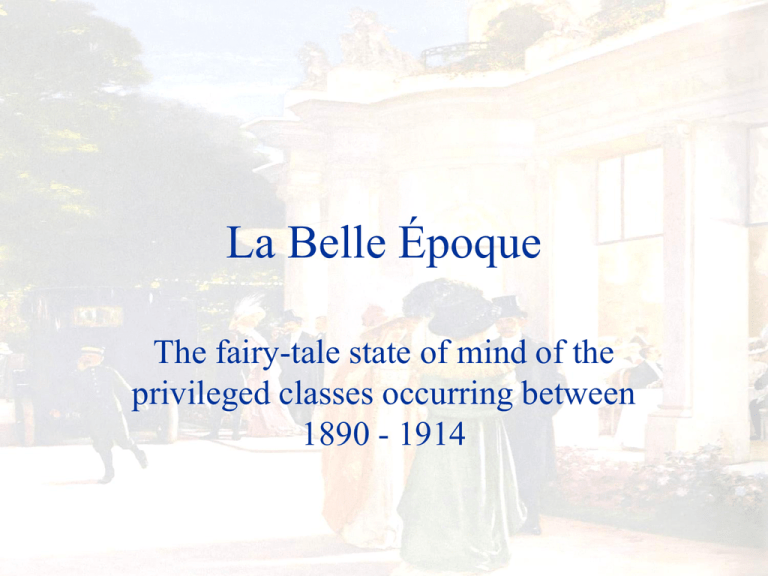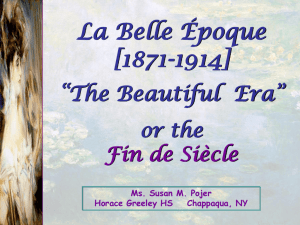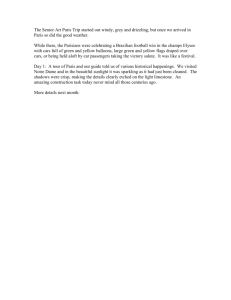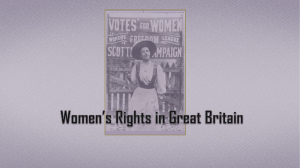La Belle poque
advertisement

La Belle Époque The fairy-tale state of mind of the privileged classes occurring between 1890 - 1914 Origins • took place during a period of world peace • was the product of a new class that had acquired wealth through the industrial revolution and technological advances • based on a new kind of order imposed by an insecure privileged class Characteristics • • • • Denial of the grim realities of life Embrace of manners and etiquette Rejection of showing any kind of emotions Deification of technology Dormitory at a Russian factory Salvation Army “coffins” were used as beds for the destitute. Poor children were dependent on collective soup kitchens. Children at work under terrible conditions Welsh mine workers Ascot Fashions seen at Ascot, 1905 Sandown A prim and proper British Edwardian family The “Gibson Girl” image of the beautiful, well-bred woman with upswept hair and tiny waist was created by the American cartoonist Charles Dana Gibson and inspired by his wife. The grim reality of a poor family The children of the wealthy were brought up by servants and had little contact with their parents. Diana of Dobsons, a play based on the grind and squalor of the London shop girl. Shop assistants worked long hours for low pay. Their work was physically exhausting and demanded considerable concentration as well as the effort of maintaining an air of politeness. Chicago’s 1893 World’s Columbian Exposition Exposition Universelle The 1900 Paris World’s Fair The Machine Gallery National Idiosyncrasies Characteristics France Pursuit of pleasure, culture, and beauty Paris was the fashion capital of the world • Marcel Proust His novel Remembrance of Things Past revealed that beneath the surface of French refinement, there existed all kinds of vulgar and perverse behaviors. England Pursuit of power through the colonization of one quarter of the world African banana plantation Queen Victoria (1819 – 1901) King Edward VII (1841-1910) • Oscar Wilde refused to play by Victorian rules. • When he publicly came “out of the closet”, he was condemned to jail. Oscar Wilde and Lord Alfred Douglas United States Pursuit of wealth The Biltmore Estate, Asheville, North Carolina Consuelo Vanderbilt (1876–1964) was “sold” to the highest title in England. Forces that Destroyed La Belle Époque • • • • • Anarchism Artists and intellectuals The suffragette movement Technology World War I Anarchism • Anarchists did not believe in the rule of law. • As many as five heads of states were assassinated by anarchists. President McKinley’s assassination (1901). A police file card of a Russian woman suspected to be an anarchist Artists and Intellectuals • began to question the accepted rules and ideas • explored the interior world of the psyche as well as the hypocrisy of society • created their own conventions Sigmund Freud Freud’s couch The Suffragette Movement • Women wanted equal rights and the right to vote. • Women protested their dehumanization into men’s “playthings”. Protestor being led away by bobbies A suffragette on a hunger strike in prison being force-fed Emeline Pankhurst, founder of the British suffragette movement Emily Davison threw herself under the King’s Derby horse Anmer on June 4, 1913. Technology • was deified by La Belle Époque • was the means of living a more leisurely life style • leveled class barriers when it became more accessible to many • turned treachorous when used to create the new WW I weaponry Entrance to the 1900 Paris World Fair Interior, 1900 Paris World Fair German three-phase motors and transformer factory Ford Motors auto workers’ assembly line The front page of the New York Times, April 16, 1912 World War I • The reality of the war could not be kept at bay by the privileged classes. • Many aristocrats and rich people volunteered and were killed. Assassination of Archduke Ferdinand The Archduke had just visited the victims of a bomb intended for him when Gavrilo Princip stepped out of the crowd and killed him. Gavrilo Princip being apprehended by Serbian police. The European Powers, many of whom were related by blood, attended Archduke Ferdinand’s funeral in Vienna. The reality of World War I The end of La Belle Époque



